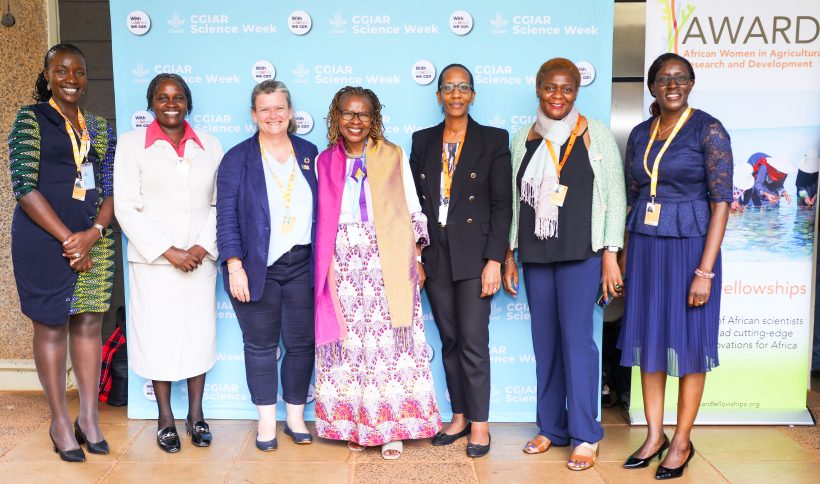
By Florence Sipalla,
Working in partnership with the CGIAR GENDER Accelerator, AWARD held a side event during the CGIAR Science Week that was held in April 2025 in Nairobi, Kenya. This event brought together a panel of experts to unpack the status of women in agrifood systems (AFS) in sub-Saharan Africa. This discussion was anchored by a presentation by AWARD Director, Dr. Susan Kaaria, who gave a sneak peek into the report that will be launched later this year at the African Food Systems Forum. “Employment in agrifood systems is more important to women compared to men,” said Kaaria, noting that women play a variety of roles along the agricultural value chain, citing the market queens of Ghana and the casual laborers who play an important role in agriculture across the continent.
Dr. Nicoline de Haan, director of the CGIAR GENDER Accelerator, indicated that the report provides context-specific insights that would inform policymakers on the African continent. De Haan also shared the journey that led to the inception of this work following the launch of the Food and Agricultural Organization (FAO) 2023 The Status of Women in Agrifood Systems (SWAF) global report. “Having Africa-specific data is important as it gives more ammunition for policy makers.” She urged participants to move the conversation on women in agrifood systems beyond the notion that women are overburdened and provide insights that would inform targeted policy action. De Haan captured the intention of the AFS report partners as she described the work as one of evidence, allyship, collaboration and solutions. The AFS report is prepared by a consortium led by AWARD, FAO, and the Natural Resources Institute together with the CGIAR GENDER Accelerator. The work was funded through a grant from the International Development Research Centre (IDRC).
Limited access to resources is a key impediment to women’s growth in AFS. This is underlined by the patriarchal systems prevalent in sub-Saharan Africa. “How is it that women in agricultural food systems do not have money in their pockets?” asked Elizabeth Nsimadala, an AWARD mentor and President, East African Farmers Federation (EAFF). Nsimadala lamented stating that women were often employed in the less lucrative levels of the agriculture value chain. “The EAFF is working to ensure that women have more meaningful participation in the policy space, through coaching and mentorship,” she added. Nsimadala lauded the work of male champions in breaking the silos, sharing that she received mentorship from men who helped her navigate the policy arena and career growth. The EAFF is currently working to sensitize women on the EU green deal to ensure women can comply with the policy regulations that will affect coffee and cocoa farmers. The influence of patriarchy in limiting women’s access to land was also highlighted with reference to differences in the continent by Dr. Eileen Nchanji, a gender expert with the Alliance of Bioversity International and CIAT. She noted that women in some African countries could only own land by proxy, working with male relatives yet in Kenya, women are able to acquire land in their names.
In addition to working in farms and markets, women also have the responsibility of taking care of children, the elderly and the sick in the domestic sphere. Providing a donor perspective, Dr. Annet Mulema, senior program officer at IDRC reiterated the importance of providing innovative solutions to address women’s burden of care work which affects women engaged in AFS. “Interventions should go beyond providing employment to designing more holistic approaches,” said Mulema adding that bundling interventions would help break the silos by providing intersectional data and inform investment from donors and mobilize resources from private sector partners to build resilient communities.
Elizabeth Yegon, head of the Gender Department in Kenya’s Agriculture Ministry noted that the government launched the National Care Policy (2023) that speaks to unpaid care work, especially in agriculture. She also noted that in keeping with Kenya’s Constitution (2010), the government is emphasizing the adherence of the one-third gender rule in the agriculture value chain, especially in governance, starting with the grassroots cooperative movement. “We have to be intentional in targeting women and including them in being part of the solution,” added Catherine Rusagara, head of Youth Entrepreneurship for the Future of Youth and Agriculture at AGRA. She also highlighted the importance of giving the youth a voice when discussing policy and tailoring solutions in technology, data and analytics. “We make up 60% of the population on the continent but you do not include us in policy making,” said Rusagara, citing youth actors.
“It is important to spotlight what is working, to ensure it can be replicated across the continent,” said Dorine Odongo, AWARD senior communications manager who moderated the panel discussion. All the speakers emphasized the need to go beyond highlighting the numbers of women in agriculture to also documenting the impact of their contributions to agrifood systems.
See the event recording and photos.
